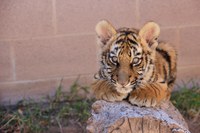ABQ BioPark Helps to Rescue Tiger Cub
On Tuesday, Jan. 10, the ABQ BioPark was called upon by the New Mexico Department of Game & Fish to assist with the care of a tiger cub that was rescued during a criminal investigation. The approximately three-month-old male cub was found in a plastic dog carrier in a private home. It is illegal to have tigers or other dangerous animals in New Mexico outside of permitted zoos, so the tiger was confiscated and brought to the BioPark for temporary care.
After 48 hours in the BioPark's care, the 23.5-pound cub is doing very well. He is being fed a nutritionally-balanced diet that provides all of the vitamins and minerals needed by a growing tiger. He has received vaccines for rabies and distemper and is surrounded by a variety of enrichment opportunities in large indoor and outdoor play spaces. The BioPark will be conducting a complete physical exam, which will include fecal tests, bloodwork and x-rays, to get a full picture of the cub’s health.
In the wild, a three-month-old cub would be weaning off its mother’s milk and transitioning towards a diet of meat. At the BioPark, the cub is receiving high quality meat, and staff will start using milk for training. Wild cubs at this age would also be learning important social cues from their mother and littermates. Play is an important tool for tiger cubs as they practice the pouncing, climbing and stalking skills they will need as adults. Specially trained BioPark staff are providing socialization for the cub at this time to support his physical and social development.
Rescue work like this is part of the ABQ BioPark's responsibility for animal well-being. Because of the expertise of the its veterinary and animal care teams, the BioPark has regularly assisted in rescuing and rehabilitating illegally kept animals as well as animals injured in the wild. Last year, the BioPark provided life-saving care to the famed Mexican gray wolf, Mr. Goodbar, and a confiscated alligator.
Exotic animals do not make good pets. In the wild, tiger cubs remain with their mother for approximately two years in order to learn all the skills they need to survive as an adult. Often in the illegal animal trade, cubs are separated from their mothers to be hand-reared, which can cause long-lasting impacts on the cats' physical and mental development. Tigers require expensive food, specialized medical care and very large spaces to maintain their physical health. Their emotional well-being also requires the opportunity to socialize with other tigers and to utilize their natural behaviors. Keeping neighbors, children and small pets safe around a mature tiger requires expensive infrastructure. For these reasons and more, the BioPark has supported the Big Cat Public Safety Act.
Bunga, the adult male Malayan tiger living at the ABQ BioPark Zoo gets over ten pounds of meat each day. He receives other specialized foods for additional nutrients, to encourage natural behaviors and to keep his teeth and claws sharp. His new home in the upcoming Asia exhibit opening later this year, will feature 7,800 square feet of space to roam outdoors, including a 15-foot climbing structure. Every day, he receives a variety of enrichment to allow him to behave like a wild tiger. His caretakers have developed a strong bond and trust with Bunga, which empowers him to participate in his own medical care. For example, he voluntarily receives vaccine injections, gets his claws trimmed and opens his mouth for dental exams.
The BioPark is committed to the conservation of Malayan tigers, of which fewer than 300 remain in the wild. The new Asia exhibit is designed to accommodate Bunga and an adult female with cubs. Because conservation of the Malayan tiger is of urgent importance, the BioPark will remain focused on that species and will not become a lifelong home for the confiscated cub whose genetic makeup is unknown. The BioPark is actively working with other zoos and approved sanctuaries to locate a forever home. Priority will be placed on sites with other tigers so that the cub can learn the socialization skills that he needs for emotional well-being.
The tiger cub’s story has already attracted enormous interest from the public. For those who are inspired to help, we offer the following suggestions:
- When you consider a pet for your family, make sure you can provide an entire lifetime of the best care for the animal so that it will not require rescue or a new home. Tigers and other dangerous exotic animals are illegal to own in New Mexico and should never be considered as a pet.
- Visit AZA-accredited or Animal Humane-certified zoos and aquariums when you travel. These facilities work together to support healthy populations of animals and don't breed tiger cubs to be hand-raised for public encounters.
- Support the BioPark's work by making a donation to the New Mexico BioPark Society. Designate your funds to animal care to help support its rescue work as well as the care of animals that will always call the BioPark home.

